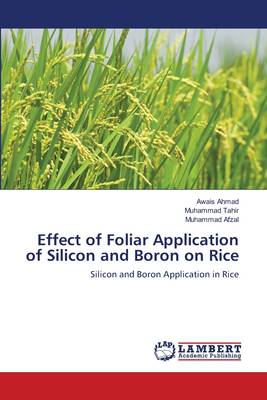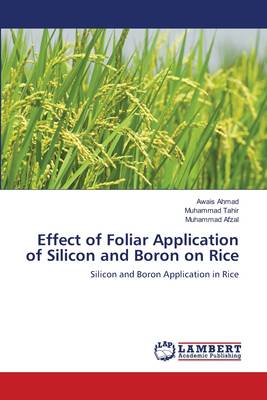
- Afhalen na 1 uur in een winkel met voorraad
- Gratis thuislevering in België vanaf € 30
- Ruim aanbod met 7 miljoen producten
- Afhalen na 1 uur in een winkel met voorraad
- Gratis thuislevering in België vanaf € 30
- Ruim aanbod met 7 miljoen producten
Zoeken
Effect of Foliar Application of Silicon and Boron on Rice
Silicon and Boron Application in Rice
Awais Ahmad, Muhammad Tahir, Muhammad Afzal
Paperback | Engels
€ 58,45
+ 116 punten
Omschrijving
Pakistan is 3rd top producer of rice with 2.36 M ha area, 4.82 MT production, 0.9% of GDP and contributes 4.4% in agriculture annually. Pakistani rice is well known for its quality and aroma and ranked as 5th country for rice export but yield level is comparatively low and 36% yield gap has been observed. It has been deduced from the research that along with NPK, silicon (Si) and boron (B) should be introduced in rice production. Silicon can control drought stress, insect pests, diseases, radiation damage and metallic toxicity (Fe & Al) in rice. It also provides mechanical strength, prevents lodging and enhances photosynthetic activity and plant immunity. While boron (B) regulates carbohydrates transportation, cell division, cell wall strength and development, onset of fruits and seeds, pollen viability and affects plant development, reproduction, respiration and physiology. That s why this study was proposed and resulted that a combination of silicon and boron solutions @ 1.5% and 1.0% respectively should be applied as foliar spray for higher and sustainable rise production.
Specificaties
Betrokkenen
- Auteur(s):
- Uitgeverij:
Inhoud
- Aantal bladzijden:
- 132
- Taal:
- Engels
Eigenschappen
- Productcode (EAN):
- 9783659138348
- Verschijningsdatum:
- 24/05/2012
- Uitvoering:
- Paperback
- Afmetingen:
- 152 mm x 229 mm
- Gewicht:
- 204 g

Alleen bij Standaard Boekhandel
+ 116 punten op je klantenkaart van Standaard Boekhandel
Beoordelingen
We publiceren alleen reviews die voldoen aan de voorwaarden voor reviews. Bekijk onze voorwaarden voor reviews.











